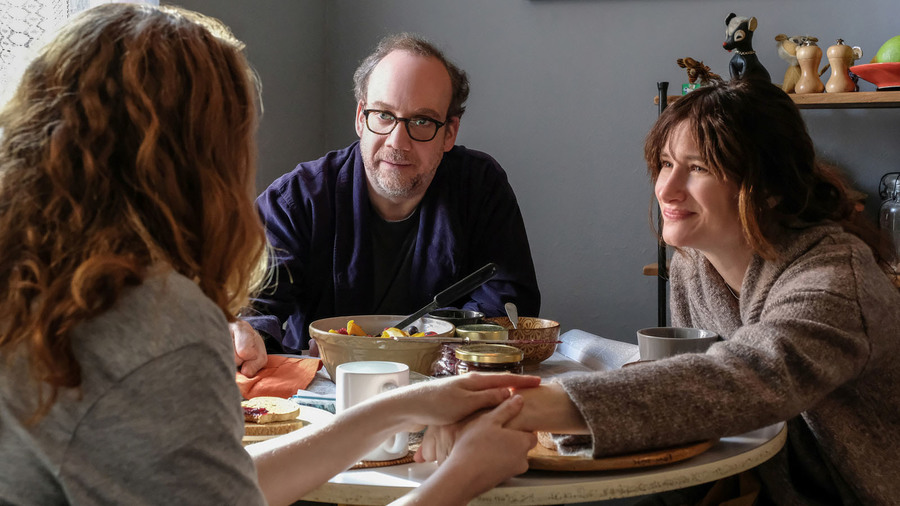
“Rachel (Kathryn Hahn) and Richard (Paul Giamatti), the beleaguered bohemian-geek couple at the center of Private Life, have been trying, through fertility treatments, to get pregnant for years,” begins Variety’s Owen Gleiberman. Private Life “is a comedy of fragile hopes and frayed nerves: the story of how these two attempt to have a child by any means necessary—a goal that should bring them together, but instead, after too much failure, it’s tearing them apart. . . . This is first film [Tamara] Jenkins has made since The Savages (2007), that marvelous comedy that teamed Philip Seymour Hoffman and Laura Linney as neurotic adult siblings trying to figure out a way to care for their dementia-afflicted father.” Private Life “is made in the same anxious spirit of fast-talking, throttled humanity. Yet it doesn’t give you the same buzz; it’s witty and moving but a touch repetitive, and it goes on for too long. That said, Jenkins has made the most intimate comedy imaginable about the fertility blues.”
At RogerEbert.com, Brian Tallerico notes that Private Life “takes its major turn into something a bit more forced when Rachel and Richard’s step-niece, Sadie (Kayli Carter), comes to stay with them just as their doctor is suggesting an egg donor. . . . While there are earth-shaking emotions at play, at its best, Private Life is a film of beautiful minor beats. There are details in Rachel and Richard’s life—for example, every inch of the production design of a NY apartment occupied by a writer and a theater director seems considered—that greatly enhance this character study. We don’t see that subgenre of film that often anymore, as so many dramas feel like they have something important to say about the entire human condition. This is a ‘character study,’ the story of Rachel, Richard, and Sadie—and it works best when it allows those three characters to breathe, to live, and to feel.”
“Jenkins has a number of issues she wants to tackle with her latest endeavor such as a continuing debate over modern feminism, ageism and whether a successful career can be an adequate supplement for the lack of a family (and vice versa), among others,” suggests Gregory Ellwood at the Playlist. “The good news is her skills as a filmmaker have never been so sharp. . . . That being said, it seems to have all become too precious in the editing room as the same thematic point is frustratingly made again and again.”
Jenkins “sometimes seems to purposely stretch things out to make us feel the agony of its protagonists’ efforts,” finds the Hollywood Reporter’s John DeFore. “But looked at independently, so many scenes contain something raw or truthful that one understands Jenkins’s reluctance to trim.”
“Family dynamics don’t come more complicated than this,” writes Kevin Fallon for the Daily Beast. “And yet, there’s something endearing about the family unit Rachel, Richard, and Sadie form during the IVF treatments, a united goal to distract them from the dejection that reality has all-too-frequently brought them—not to mention the paranoia that it’s coming for them again.”
“There’s always this delay,” Jenkins tells IndieWire’s Anne Thompson, who notes that this is “not the first time this has happened. The Savages came nine years after her first feature, the 1998 Fox Searchlight comedy Slums of Beverly Hills based on her high school years with her broke single father.” But The Savages “became mired in development hell.” Then, Round Two. And now she’s “emerged from her directing hiatus never having shot on digital before, making a $9 million film for Netflix that will barely screen in theaters. But she got to make her movie.”
For news and items of interest throughout the day, every day, follow @CriterionDaily.
from The Criterion Current http://ift.tt/2DtlamA
Nessun commento:
Posta un commento